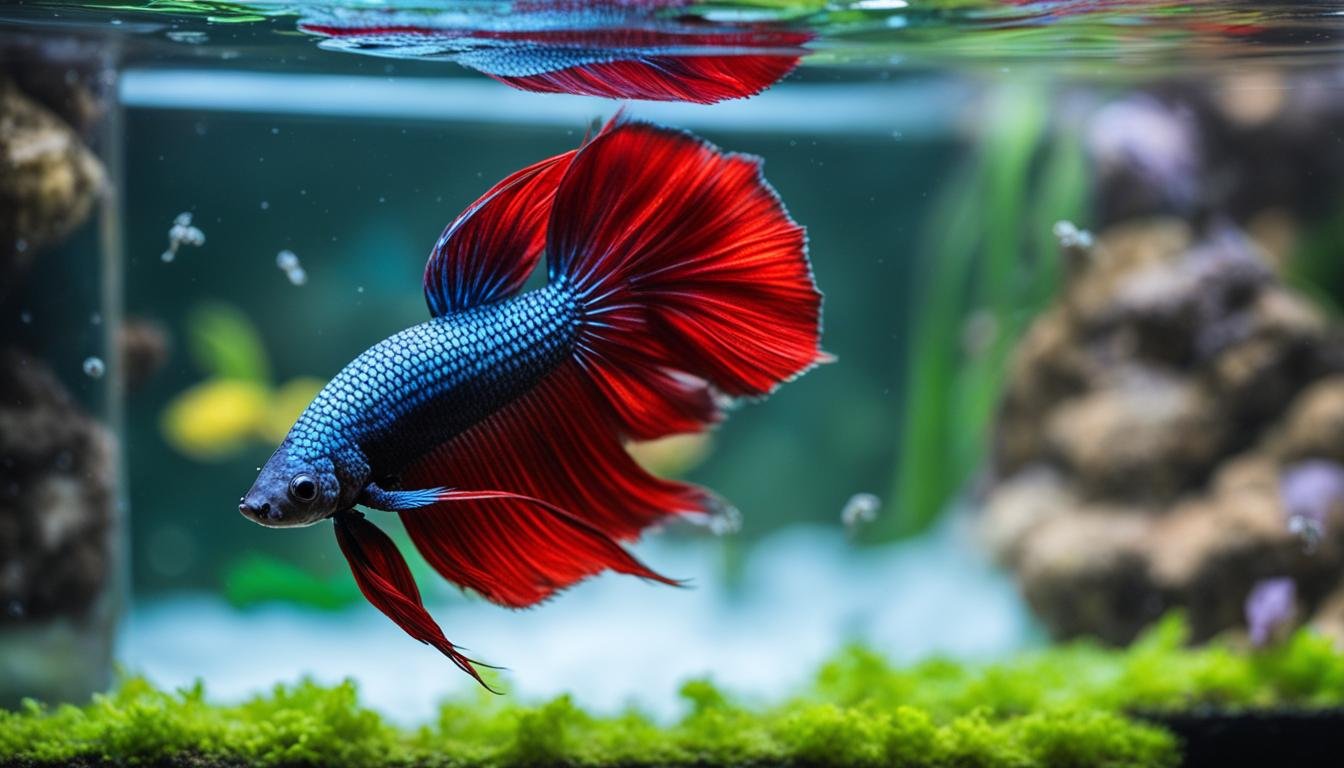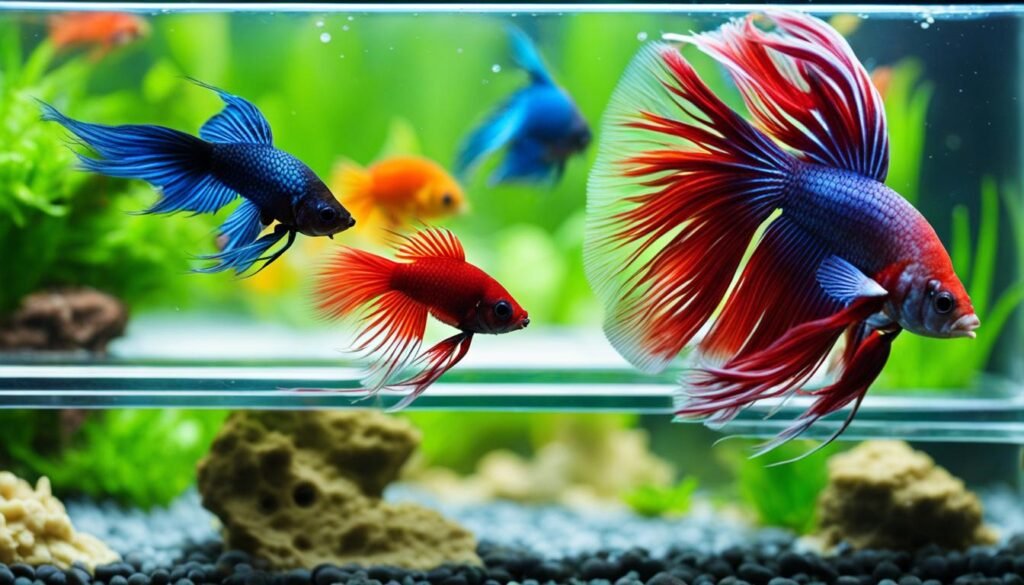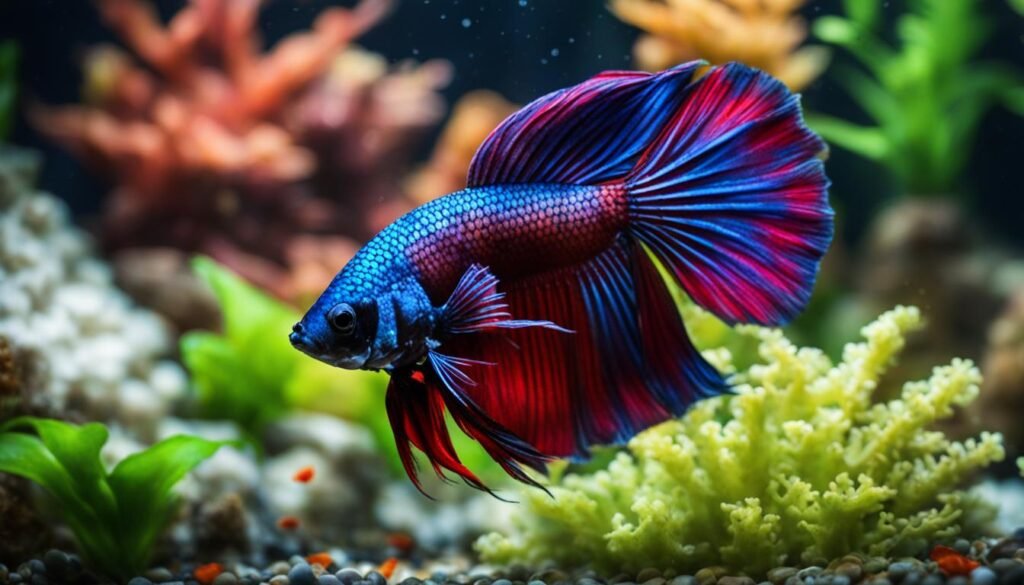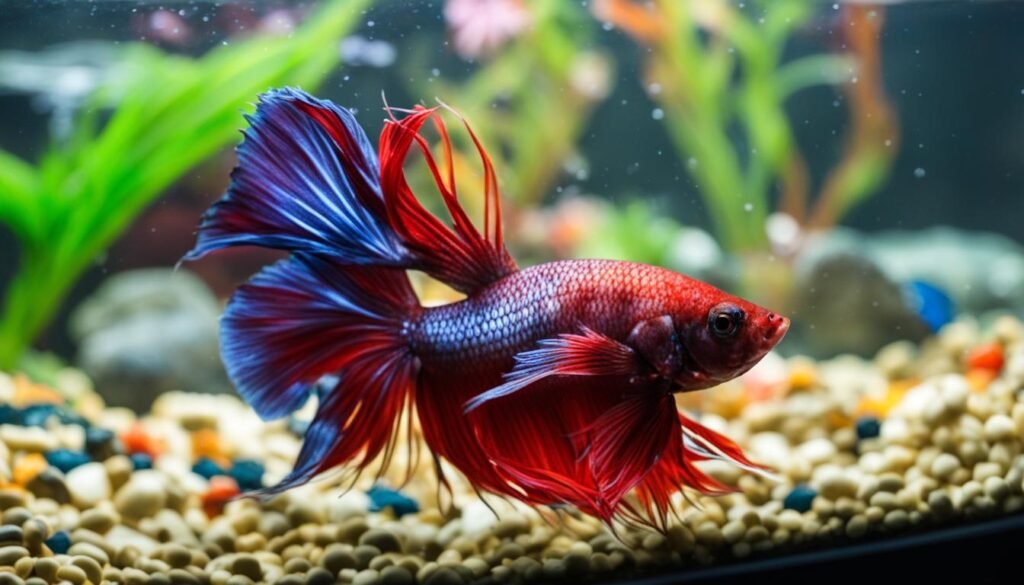Your cart is currently empty!

Can Betta Fish Eat Ants? Discover Unusual Betta Diets!
Welcome to our article on the unusual diets of betta fish! Today, we’ll be exploring the question: can betta fish eat ants? Betta fish, also known as Siamese fighting fish, are carnivorous creatures that require a diet rich in protein to thrive. While they naturally consume a variety of small insects and invertebrates in the wild, we need to consider the safety and nutritional value of ants as a potential food source for betta fish in a home aquarium setting.
Key Takeaways:
- Ants can provide a source of protein for betta fish, but they should be considered as an occasional treat rather than a regular part of their diet.
- There are various commercial betta fish food options available, including pellets, flakes, frozen food, and live food, which provide a balanced diet for betta fish.
- Feeding ants to betta fish can pose risks such as digestive issues and potential parasitic infections, so it’s essential to source ants from a safe and chemical-free environment.
- There are several alternative foods for betta fish, including live options like brine shrimp, bloodworms, and daphnia, as well as frozen or dried foods such as bloodworms and brine shrimp.
- Providing a balanced diet that includes a combination of commercial betta fish food and supplements ensures that betta fish receive all the necessary nutrients for their health and well-being.
The Nutritional Value of Ants for Betta Fish
When it comes to the diet of betta fish, it’s important to provide them with the right balance of nutrients for their overall health and well-being. Ants can be a source of protein for betta fish, which is essential for their growth and development. Protein-rich diets help maintain healthy muscles and promote proper organ function in betta fish.
However, it’s worth noting that while ants can contribute to the protein intake of betta fish, they may not provide all the necessary nutrients they need to thrive. Ants are not a complete food source and should be considered as an occasional treat rather than a staple part of their diet. It’s essential to offer a variety of foods to ensure betta fish receive a well-rounded and balanced diet.
In addition to protein, betta fish also require other nutrients such as vitamins, minerals, and fats. These can be obtained from a combination of commercial betta fish foods, live or frozen food options, and supplements. This variety helps ensure that betta fish receive all the essential nutrients they need to maintain optimal health and vitality. Consulting with a veterinarian or experienced fish keeper can provide further guidance on achieving a balanced diet for your betta fish.
The Nutritional Value of Ants:
- Source of protein
- Supports muscle growth and organ function
- Should be an occasional treat, not a staple food
Building a Balanced Diet for Betta Fish:
- Include a variety of commercial betta fish foods
- Incorporate live or frozen food options
- Consider adding supplements
- Consult with a veterinarian or experienced fish keeper for personalized advice
Commercial Betta Fish Food Options

When it comes to providing a balanced diet for our betta fish, commercial betta fish food options are a convenient and reliable choice. These specially formulated foods are designed to meet the nutritional needs of betta fish, ensuring they receive the essential nutrients for their health and well-being.
One popular type of commercial betta fish food is betta fish pellets. These small, bite-sized pellets are packed with protein and other vital nutrients. They are available in various formulas, including those that cater to specific dietary requirements or address specific health concerns.
Betta fish flakes are another option for feeding our finned friends. These thin, lightweight flakes are easy for betta fish to consume and provide a variety of nutrients. They often contain a mixture of protein, vitamins, and minerals to support the overall health of betta fish.
For those who prefer to provide a more varied diet, frozen betta fish food can be a great choice. Frozen foods such as bloodworms and brine shrimp offer a natural and nutritious option for betta fish. They can be thawed and fed to the fish, mimicking their natural diet in the wild.
Lastly, live betta fish food, such as brine shrimp or daphnia, is a favorite among betta fish enthusiasts. Live food provides an opportunity for betta fish to engage in natural hunting behaviors, adding enrichment to their daily routine. However, it is important to ensure that the live food is obtained from reputable sources to avoid introducing any harmful bacteria or parasites to the aquarium.
Choosing a Balanced Diet for Betta Fish
When feeding our betta fish, it is crucial to provide a balanced diet consisting of a combination of these commercial betta fish food options. This ensures that betta fish receive a wide range of nutrients and prevents them from becoming reliant on a single type of food.
While commercial betta fish food forms the foundation of their diet, it is also important to supplement it with other foods to promote optimal health. Offering occasional treats such as freeze-dried or freeze-frozen options can provide additional variety and enrichment.
Remember, the key to a well-rounded diet for betta fish is moderation. Overfeeding can lead to obesity and other health issues, so it is essential to feed them the appropriate amount of food based on their size and activity level. Following the recommended feeding guidelines on the packaging of the commercial food can help us ensure our betta fish stay healthy and thrive.
In conclusion, commercial betta fish food options such as pellets, flakes, frozen food, and live food provide a convenient and nutritionally balanced choice for feeding our betta fish. By offering a combination of these foods and ensuring moderation in feeding, we can help our finned friends thrive and live a healthy life.
Potential Risks of Feeding Ants to Betta Fish
While ants can provide a source of protein for betta fish, there are potential risks associated with feeding them to your fish. It’s important to be aware of these risks in order to make an informed decision about including ants in your betta fish’s diet.
1. Digestive Issues
Feeding ants to betta fish can sometimes lead to digestive issues. Ants contain exoskeletons that are difficult for betta fish to break down and digest. If your fish consumes a large quantity of ants or has a sensitive digestive system, it may experience bloating, constipation, or other digestive discomforts.
2. Parasitic Infections
Another risk of feeding ants to betta fish is the potential for parasitic infections. Ants can carry parasites, such as mites or nematodes, which can be harmful to your fish. These parasites can infect your fish’s gastrointestinal tract and cause health problems if ingested.
3. Harmful Toxins
Ants may also contain harmful toxins, depending on their environment and diet. Pesticides, chemicals, or toxins present in the ants’ habitat can be transferred to your fish when they consume them. These toxins can have detrimental effects on your betta fish’s health and well-being.
Considering these potential risks, it is important to exercise caution when feeding ants to your betta fish. It is recommended to source ants from a safe and chemical-free environment, and to offer them as an occasional treat rather than a regular part of your betta fish’s diet. Consulting with a veterinarian or experienced fish keeper can provide further guidance on the safety of including ants in your fish’s diet.
Image:
Alternative Foods for Betta Fish

If you’re looking to diversify your betta fish’s diet, there are several alternative foods that can provide nutritional benefits. These options can be used as occasional treats or supplements to their regular diet. Here are some alternatives to consider:
1. Live Food:
Live food is a great way to mimic a betta fish’s natural diet and provide them with enrichment. Brine shrimp, bloodworms, and daphnia are popular live food options. These can be purchased frozen or live, depending on availability. Live food provides a source of protein and stimulates their hunting instincts.
2. Frozen Food:
Frozen food is another convenient option that offers variety. Many betta fish enjoy frozen bloodworms and brine shrimp. These types of frozen food are readily available in pet stores and can be easily stored in your freezer. Thaw the desired amount before feeding.
3. Dried Food:
Dried foods such as freeze-dried bloodworms and brine shrimp are a convenient alternative. They are shelf-stable and can be easily portioned for feeding. However, it’s important to soak dried foods in water before feeding to prevent digestive issues.
Remember, when introducing any new food to your betta fish, it’s essential to monitor their response and adjust accordingly. Overfeeding can lead to health issues, so be mindful of portion sizes and feedings.
The Importance of a Balanced Diet for Betta Fish

When it comes to keeping our betta fish healthy and thriving, providing them with a balanced diet is of utmost importance. A balanced diet ensures that our betta fish receive all the necessary nutrients they need for optimal health and well-being. Let’s take a closer look at why a balanced diet is crucial for our betta fish.
The nutritional needs of betta fish
Betta fish have specific nutritional needs that must be met to support their growth and overall health. They require a protein-rich diet, as they are carnivorous by nature. Protein helps with muscle development, fin regeneration, and overall vitality. Additionally, betta fish need a variety of vitamins and minerals, such as vitamin C, vitamin D, calcium, and iron, to support their immune system and keep their bones and scales strong.
The risks of an imbalanced diet
Feeding our betta fish an imbalanced diet can have negative consequences on their health. A diet lacking in essential nutrients can weaken their immune system, making them more susceptible to diseases and infections. It can also lead to issues such as fin rot, poor growth, and even organ failure. On the other hand, overfeeding or feeding an excessive amount of certain foods can result in obesity, constipation, and swim bladder disorders.
How to achieve a balanced diet for betta fish
To provide our betta fish with a balanced diet, we can incorporate a variety of food options into their feeding routine. High-quality commercial betta fish pellets or flakes form the foundation of their diet, as they are specifically formulated to meet their nutritional needs. Supplementing their diet with occasional treats of live or frozen foods like brine shrimp, bloodworms, or daphnia can provide additional nutrients and add variety to their meals. It’s important to feed our betta fish in appropriate amounts, taking into consideration their size, activity level, and metabolism.
A balanced diet is key to ensuring the long-term health and vitality of our beloved betta fish. By providing them with a variety of nutrient-rich foods and avoiding imbalances or overfeeding, we can help them thrive and enjoy a happy, fulfilling life.
Conclusion
In summary, while it is technically possible for betta fish to eat ants, it is not recommended to make them a regular part of their diet. Although ants can provide some protein, they may not offer all the necessary nutrients for betta fish to thrive. Additionally, ants can carry harmful toxins, posing potential risks to the health of your betta fish. Therefore, it is best to opt for a balanced diet that includes commercial betta fish food and supplemented with live or frozen options.
When it comes to feeding your betta fish, it’s important to prioritize their nutritional needs. A combination of high-quality commercial food and alternative options like brine shrimp, bloodworms, or daphnia can help meet their dietary requirements. Remember to choose foods that are free from additives and preservatives to ensure the health and longevity of your betta fish.
In conclusion, maintaining the well-being of your betta fish is our utmost priority. While ants may seem like an interesting choice for their diet, it’s best to stick to a safe and reliable feeding routine. If you have any concerns or questions about your betta fish’s diet, it is always wise to consult with a veterinarian or an experienced fish keeper who can provide personalized advice based on your specific circumstances.
FAQ
Can betta fish eat ants?
Yes, betta fish can eat ants, but it is not recommended as a regular part of their diet.
Are ants a good source of nutrition for betta fish?
Ants can provide some protein for betta fish, but they may not contain all the necessary nutrients for optimal betta fish health.
What are the risks of feeding ants to betta fish?
Feeding ants to betta fish can pose risks such as digestive issues, parasitic infections, and exposure to harmful toxins.
What are the alternative food options for betta fish?
Live food options such as brine shrimp, bloodworms, and daphnia, as well as frozen or dried foods like bloodworms and brine shrimp, are popular alternatives to ants for betta fish.
Why is a balanced diet important for betta fish?
A balanced diet ensures that betta fish receive all the necessary nutrients for their growth, overall health, and well-being.
Leave a Reply